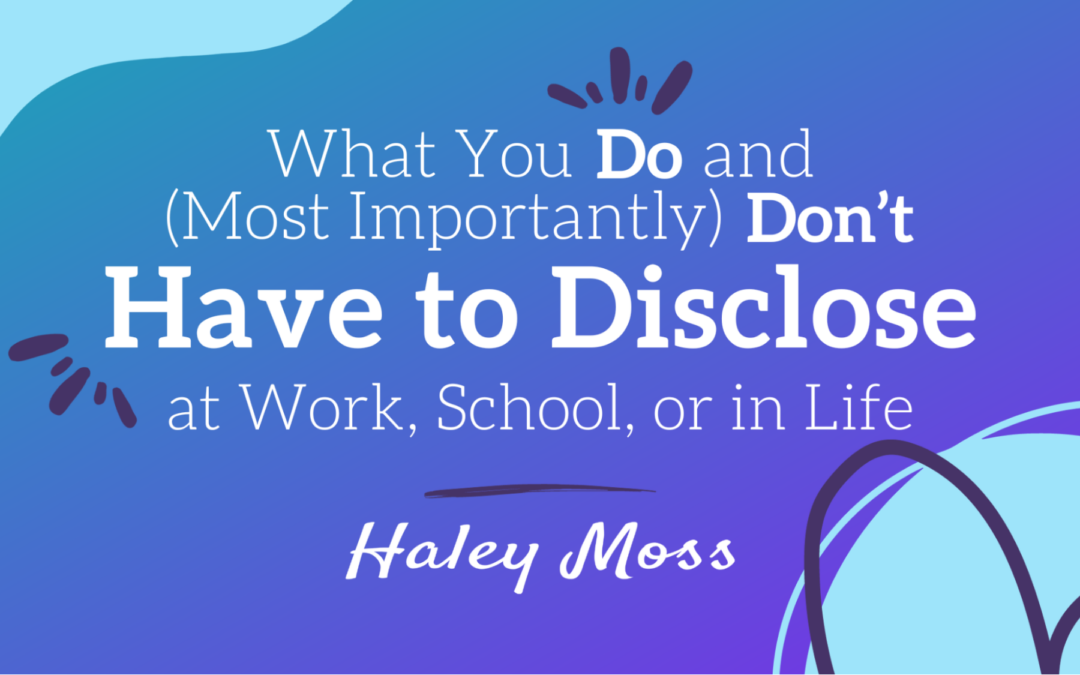Disclosing such personal information about yourself can be an overwhelming and scary topic to broach. For some, talking about ourselves in general might not be our favorite topic, and it can become more challenging when it turns to subjects like our disabilities. However, it is important to remember you have complete control over what you do and do not tell people! In this instance, it is all about you, and you can make the decisions based on your needs. It is important to remember that while you don’t need to speak up, it could be in your best interest, depending on the circumstance, to ensure you are given the proper tools to succeed.
So, let’s get into what you do and what you don’t need to disclose during significant aspects of your life.
Neurodiversity in the Classroom
Under the Individuals With Disabilities Education Act (IDEA), every child in the U.S. has the right to Free Appropriate Public Education (FAPE). No matter if you are going to preschool or high school, you are deserving of an education that works with your needs. However, since you are a child in these grades, your parents will be the ones to disclose your disability to the school and work with them to develop a plan and education that will work best for you. The information passed along to the school will strictly ensure you get the best care and education possible.
This will look like an IEP and 504 plan being developed. An Individualized Education Plan (IEP) is a specific and personalized plan for your special education, all evaluated by a team of professionals. This is essential to ensure you are getting the most out of your education. A 504 plan is how the school will provide support for you based on an evaluation that looks into the student’s medical history, academic performance, and other necessary qualifiers. Both are legally binding documents that will help guide you to a personalized education, but conversations need to be had about your needs to get there.
Neurodiversity in the Workplace
It is easy to think that not disclosing anything at all at work would just be easier so you can keep your head down and work, but more often than not, disclosing your neurodiversity to employers can be an extreme benefit and help you work at your very best. Fortunately, this country has The Americans With Disabilities Act to ensure that those with mental and physical disabilities are not discriminated against in the workplace. So, when you do disclose that information about yourself, remember that you are protected under the law.
Disclosing your disability and needs can help employers implement accommodations so you can work to the best of your ability. Without this step, requests for accommodations might not be as strongly discussed. Employers are more likely to agree to a flexible work schedule, headphone use, dimmed lighting, or other instructional options such as writing rather than verbal. Remember, employers can only ask questions pertaining to the specific conversation at hand, and they can not dig deeper into your medical history or prod at more details about you. You have control over what they need to know to ensure you work at your best.
Neurodiversity in Life
Moving around life with a disability can be challenging and a different experience for everyone. But no matter who you are, you have complete control over what you say to those around you and what you want people to know about you. Disclosing your disability to new friends might seem daunting, but it could be a healthy choice to help avoid masking for too long and to set up a strong foundation between you and the other person. When it comes to extended family, you can choose whether or not you think they should know basic information or a deeper story of who you are.
Life with a disability can place more obstacles in the way and make you question what you do and not tell people, but at the end of the day, that decision is based solely on your comfort level and needs in that situation. There is no rule saying you must tell everyone you meet, and there is no rule saying the level of information you tell people must be the same across the board. This is your life; you are in control, and your safety and comfort are at the top of the priority list.
If you have further questions or wish to have me speak at your next event, contact me!

